Photography by Tommy Leonardi C’89
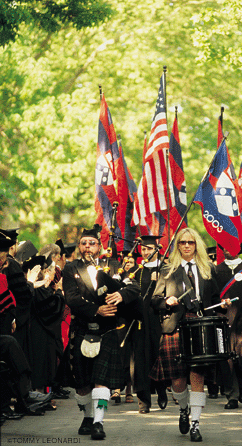
“I hear the bagpipes, Kate!” called out a gray-bearded man standing near Oldenberg’s “Split Button.” Sure enough, if you listened hard, you could hear the melodious droning squawk of “Scotland the Brave” drift down a sun-dappled Locust Walk. A moment later, the long procession of University administrators and honorands in medieval robes and caps shimmered into view.
It was a Brigadoon moment, heralding the University’s 247th Commencement. And as the academic procession halted across from the Button, and the long ranks of faculty divided to allow the 6,000 graduating students to pass by, the stress and strife of academic life melted away into a long stream of smiles and clapping and congratulations, faithfully recorded by digital cams, cell phones, old-fashioned film cameras—and brain cells.
An hour later, on a dazzlingly bright Franklin Field, the concerns of the outside world mingled with the pageantry. Archbishop Desmond Tutu of South Africa, who received his honorary degree with the other honorands at Franklin Field [see below], also got some boos from the audience for remarks perceived to be insensitive to Israel and Jews.
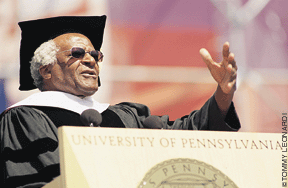
Cheers and applause followed his statement that peace and justice “will come when Israel is recognized as a sovereign state with sovereign boundaries that are recognized and respected by all.” But when he added that such peace and justice will “come only when there is a viable Palestinian state, sovereign, recognized, and accepted,” some boos and jeers mixed with applause from the stands.
Tutu, a leader in the anti-apartheid movement, winner of the 1984 Nobel Peace Prize, and later head of South Africa’s post-apartheid Truth and Reconciliation Commission, exhorted his audience to become “God’s partners” and bring all members of the human “family” into the fold—including such rival pairs of siblings as Yasir Arafat and Ariel Sharon, George W. Bush and Osama bin Laden.
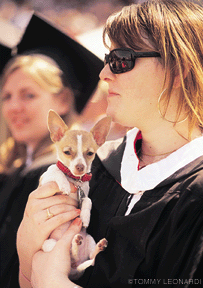
“As we learned in South Africa, there is no way in which you are going to have true security that comes from the barrel of a gun,” he said in a charged, melodious voice. “But true security happens when there is justice. And so we weep as we see what happens in Northern Ireland. Our hearts bleed as we see what happens in the Middle East. And we say, if it could happen in South Africa, it is possible for there to be peace, for there to be justice, for there to be equity in Northern Ireland, in the Middle East.”
It is “possible for enemies to become friends,” Tutu added in increasingly passionate tones: “God says, ‘I have a dream, that all of you, my children, will realize that you belong in one family. This is a family in which there are no outsiders—all, all, all are insiders: all!’”
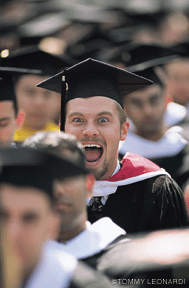
Rising to an almost evangelistic fervor, he continued: “You see, when Jesus spoke about his death, he said, ‘If I be lifted up, I will draw all’—he didn’t say, ‘I will draw some’; he said, ‘I will draw all! All! All! Black, white, rich, poor, American, Iraqi, Afghani —all! All! All! All! Gay, lesbian, straight—all! All! All! All belong in this family! All! All! Arafat, Sharon!—all! All! All! George Bush, Bin Laden—all! All!’”
Finally, his voice quieting, he concluded: “And God says, ‘I have no one except you to help me realize my dream. Will you help me?’”
By the time he finished, the overwhelming majority of students were on their feet, applauding. And no boos could be heard from the stands.
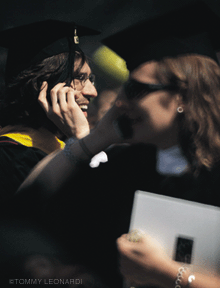
The responsibility of helping others alluded to by Tutu was one of three virtues recommended to the newly minted graduates by Dr. Lance Donaldson-Evans, professor of Romance languages and chair of the Faculty Senate.
“You have received one of the finest educations available today,” said Donaldson-Evans. “But this privilege involves responsibility—responsibility to those less fortunate than you, responsibility to your community, to your country, to the world.” Another virtue he cited was humility, which—contrary to popular opinion—is a “strength and involves acknowledging both our abilities and our limitations.” The third, also usually interpreted as a weakness, is “docility,” which “literally means, ‘easy to teach.’”
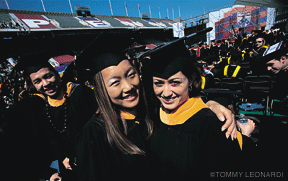
“You’ve all demonstrated docility (although with some of you, we faculty sometimes had our doubts!), but docility should be a life-long attitude and cannot end when you leave Penn,” he said. And, he concluded: “If you practice humility, docility, and responsibility, you can make a difference. Indeed, as graduates of the University of Pennsylvania, you must make a difference.”
After saluting the new graduates on their accomplishment, Penn President Judith Rodin CW’66 said: “Please remember that the reason you came to Penn was to learn it’s not whoyou know but rather, it’s whom you know.
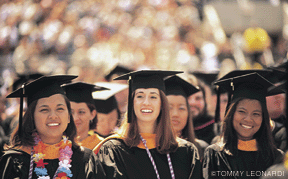
“Seriously,” she added, “you have acquired a sophisticated range of analytic and creative skills. You have gained knowledge and insights. You’ve made friends from all over the world. But you’ve also had to endure a tempest of world events as unsettling as most of us could have imagined.
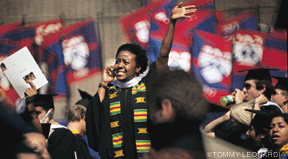
“Perhaps you have received well-meaning advice to trim your sails and lower your sights,” Rodin said. “But I believe strongly that now is not the time for observing a moratorium on your dreams. Your education at Penn has prepared you to meet any challenge—however unexpected —and to pursue any dream—however ambitious.”
She concluded by citing a Native American proverb—“As you go the way of life, you will see a great chasm. Jump; it is not as wide as you think”—and adding: “Those of us who have watched you here with great pride look forward to seeing what you find on the other side.”
Honorands
And the Honorands Are …
SADAKO OGATA Your towering presence as an international humanitarian offers a shining beacon of hope for the world’s dispossessed peoples …
As the United Nations High Commissioner for Refugees, you prevailed upon the World Summit for Social Development to deliver humanitarian aid that paved the way for social integration and voluntary repatriation in troubled countries … As Japan’s Special Representative for Afghanistan Assistance, you led your country’s participation in a 10-year reconstruction program that raised billions of dollars in pledges … In the tradition of Eleanor Roosevelt, you are a global ambassador whose devotion to universal human rights has eased the suffering of millions of people throughout the world.
PHILIP ROTH For nearly a half-century you have examined the relationship between desire and authority in contemporary American life. From the psychological tragicomedy of Alexander Portnoy’s coming of age to the broader reflections of the aging Nathan Zuckerman, your writing challenges traditional assumptions about the sexual, familial, cultural, and historical forces that shape our sensibilities. Your characters often struggle with the frustrating distance between their ideas and a stubborn reality, and you in turn force us to confront and understand ourselves through frank and at times disquieting self-examination. Yours is
perhaps the greatest gift a writer can bestow upon his readers.
DESMOND TUTU … Soon after your election as Bishop of Lesotho, you emerged as South Africa’s moral conscience by raising your commanding voice against apartheid during the 1976 Soweto uprising. As General Secretary of the South African Council of Churches, your relentless verbal assault on apartheid revealed the depth of your passion for justice and the strength of your faith …
Recognizing your capacity for healing, President Nelson Mandela appointed you in 1995 to lead the Truth and Reconciliation Commission. The appointment ensured your place in history as one of the world’s leading moral authorities and advocates for human rights.
STEPHEN BREYER Your extraordinary career as a jurist, scholar and federal official has bolstered America’s confidence in the integrity of its system of laws and justice … As a jurist, you have delivered judgments and opinions that have helped to maintain the judicial system’s fidelity to the spirit and the letter of the nation’s laws … On the U.S. Supreme Court, you have consistently fought to protect the Constitutional foundations upon which our democracy rests … Yet you have remained both a resolute and pragmatic jurist who understands how law works for the people it ultimately serves.
HERBERT J. GANS Gr’57 Your distinguished body of work in sociology and urban planning has profoundly shaped national opinion about society’s poor, and the social labels that classify us. Views of American life are clearer because your analysis, teaching, and writings sharpened our vision … You have shown how social class, ethnicity and race form the brush strokes of a community’s portrait. You awakened us to the media’s influence on our lives and our view of others …
You aim to restore citizens’ engagement with their communities, and the concrete strategies your book outlines to rectify blind spots in news reporting serve as an index to the inspiring combination of pragmatism and idealism that has animated your career.
MAMPHELA RAMPHELE Bearing witness to the cruelties of apartheid, you demonstrated enormous courage as an activist in the Black Consciousness Movement during South Africa’s violent racial struggles in the 1970s … You called on your training as a physician and your humanitarian impulses to treat the rural poor, build a community health center, and start an adult literacy program …
As the first African to be named Managing Director at the World Bank, you have provided leadership in health, education, nutrition, and social protection reforms designed to promote a universal, dignified standard of living …
By continuing to link human rights with the advancement of society, you have reminded us of our obligation “to secure the freedom, well-being and dignity of all people everywhere.”




